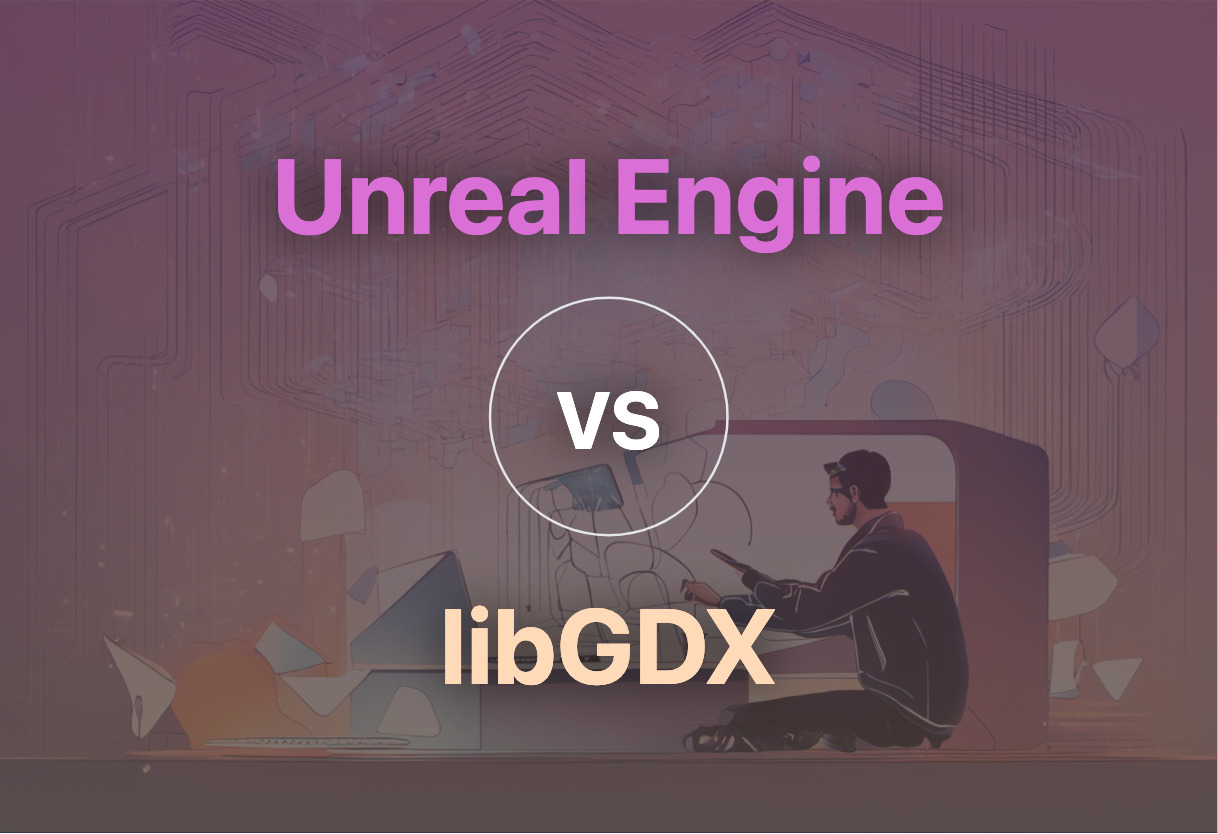For developers requiring an industry-grade, fully featured game engine, Unreal Engine is the superior choice due to its expansive capabilities and robust graphics. However, for users favouring a code-centric approach, experience with Java, and cross-platform compatibility with less hardware-demanding games, libGDX is a trusted alternative.

Key Differences Between Unreal Engine and libGDX
- Languages: Unreal Engine uses C++, while libGDX is Java-based.
- Deployment: Both support cross-platform deployment, but Unreal Engine also supports VR platforms.
- Licensing/Cost: Unreal Engine operates on a royalty model with exemptions, while libGDX is free and open source, under Apache 2.0 license.
- Graphics: Unreal Engine leverages robust graphics with real-time constructive solid geometry operations, while libGDX uses OpenGL ES 2.0/3.0 rendering.
- Editor/Development Tools: Unreal Engine has an incorporated level editor and offers project templates, whereas libGDX provides fine-grained control with more code-centric approach.
- Ecosystem: Unreal Engine features the Unreal Marketplace, while libGDX counts on an extensive third-party ecosystem.
- Support: Unreal Engine provides comprehensive support for developers and is backed by Epic Games. libGDX has strong community support with forums, Discord, and Wiki tutorials.
| Comparison | Unreal Engine | LibGDX |
|---|---|---|
| Language | C++ | Java |
| Platform Support | desktop, mobile, console, VR | Windows, Linux, macOS, Android, iOS, Web |
| Early Access/Release | 1998 | Over 10 years |
| Royalty Model | 5% of revenues over $1M | Licensed under Apache 2.0 |
| Ecosystem | Epic Games Store, Unreal Engine Marketplace | Java ecosystem, Third-party services |
| 3D support | Yes | Yes, via Bullet Physics |
| 2D support | Yes | Yes, via Box2D Physics |
| Free for Education | Yes | Yes |
| Cross-platform Targeting | No | Yes |
What Is Unreal Engine and Who’s It For?
Unreal Engine (UE), developed by Epic Games, is a series of 3D computer graphics game engines primarily used in game development. Originating from the 1998 PC game Unreal, UE has since been leveraged across various industries including film and television due to its robust platform compatibility – desktop, mobile, console and VR platforms. UE is coded in C++, and includes a level editor, UnrealEd, to support real-time geometry operations.
Primarily intended for professional and aspiring game developers, UE has also seen rising usage among filmmakers, automotive designers, and other professionals leveraging real-time technology. UE5, the latest version, continues to democratize real-time 3D tools, offering enhanced features for both the gaming and film industries. Education institutions also benefit, as UE offers free usage for schools and universities.

Pros of Unreal Engine
- Versatile across platforms: desktop, mobile, console, VR
- Deep suite of features allows high fidelity visuals
- Excellent physics engine
- Supports multiple languages, mainly C++
- Developer-friendly, with a strong marketplace for plugins
- Package includes large amount of high quality assets
Cons of Unreal Engine
- Requires reasonably powerful hardware for optimal performance
- Programming can be complex for beginners
- Performance can decrease significantly with higher resolution graphics
What Is LibGDX and Who’s It For?
LibGDX is a Java game development framework providing a cross-platform API for universal targeting support across Windows, Linux, macOS, Android, iOS, and Web. This framework, existing over a decade, is backed by a solid foundation, robust documentation, and an extensive third-party ecosystem.
Suitable for beginners who prefer the Java ecosystem as well as seasoned developers seeking fine-tuned control and platform diversity. LibGDX is licensed under Apache 2.0 and offers a stunning range of features – audio streaming, input handling, gesture detection, 2D/3D physics, networking, and more. There is also seamless integration for services like Google Play Games, Apple Game Center, and AdMob.

Pros of LibGDX
- Allows for cross-platform development with JVM based language – Java
- Rendering via OpenGL ES 2.0/3.0
- Free to use, under Apache 2.0 license
- Offers fine-grained control for developers
- Enormous community support
Cons of LibGDX
- Lack of visual scripting
- For beginners, it might seem a bit overwhelming
- Not ideal for 3D games compared to the competition
- UI could be more modern and intuitive
Code Examples for Unreal Engine & libGDX
Unreal Engine – Building a Dynamic Day-Night Cycle
This snippet details a basic setup for creating a dynamic day-night cycle in Unreal Engine 4 using C++. Ensure you have a Sky Sphere in your scene for the code to function optimally.
// ASkyCycle.h
#include <Engine/HAL/FPlatformMath.h>
#pragma once
UCLASS()
class FLATGAMES_API ASkyCycle : public APlayerController
{
GENERATED_BODY()
UPROPERTY(EditAnywhere, BlueprintReadWrite, Category = "Time")
float TimeSpeed = 100;
};libGDX – Spawning Random Stars
This code snippet in Java creates a simple algorithm for generating stars randomly across the screen in a libGDX application. Ensure libGDX version is up to date for smooth execution.
// StarField.java
import com.badlogic.gdx.math.MathUtils;
import com.badlogic.gdx.utils.Array;
import com.badlogic.gdx.utils.TimeUtils;
public class StarField {
private Array<Star> stars;
private long lastSpawnTime;
public StarField() {
stars = new Array<Star>();
lastSpawnTime = TimeUtils.millis();
}
public void update() {
if(TimeUtils.millis() - lastSpawnTime > 1000) {
spawnStar();
lastSpawnTime = TimeUtils.millis();
}
}
private void spawnStar() {
Star star = new Star(MathUtils.random(0, 1920-64), 1080);
stars.add(star);
}
}The Final Standoff: Unreal Engine vs libGDX
Not all game development platforms are created equal. Here we pit heavyweight Unreal Engine against underdog libGDX – but which comes out on top?
Indie Developers
If you’re an indie developer working solo or in a small team, libGDX is your top pick. No revenue share obligation, Apache 2.0 license, plus you can leverage broad Java ecosystem. It’s a no brainer to choose libGDX for smaller scale and/or mobile projects.

Enterprise Game Studios
Enterprise game studios, flush with ample resources and need for top-of-the-line graphical output, would do well to select Unreal Engine. High detail level editor and wider platform support gives you the edge.

Students and Educational Institutions
Unreal Engine is offered free for schools and universities – a profitable investment for future professionals. Take advantage of the opportunity to learn a top-tier AAA engine, minus the price.

Modders
Are you a modder? Unreal Engine has your back. Historical openness, especially with Unreal Engine 3, provides perfect avenue for creative renditions.

3D App Developers
Conceive of complex 3D applications? Unreal Engine is your go-to due to advanced physics and animation capabilities. Unmatched in delivering rich, immersive experiences.

In summary, when determining the winner between Unreal Engine vs libGDX, your decision should hinge on the nature of your project, expertise, and resources. Indie devs may lean towards libGDX with its open licensing and Java backbone. However, if your aspirations tower towards high-end game development, Unreal Engine’s robust physics engine and detailed editor tip the scale.
Logan Bellbrook
Content writer @ Aircada with a knack for nature & AR/VR/XR. Blogging the intersection of tech & terrain.





